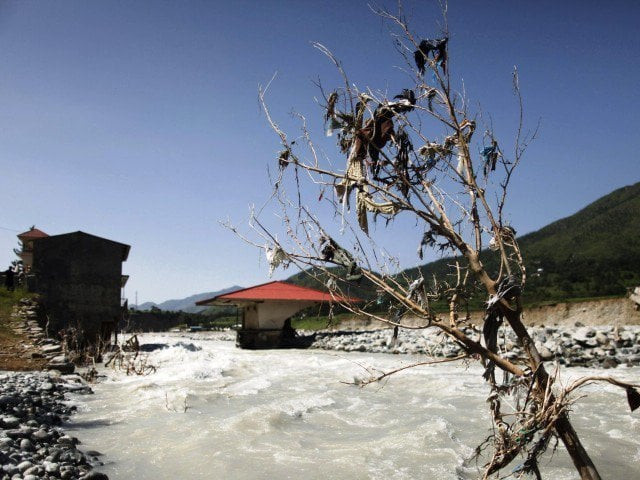Climate change: Lack of coordination, unimplemented policies put environment at risk
Country continued to suffer from adverse impacts of climate change with little done to mitigate impacts

Climate change. PHOTO: REUTERS
The situation, though, was exacerbated by a lack of coordination between concerned departments and non-implementation of adaptation and mitigation policies at the public and the private level. This meant that the country remained vulnerable to climate change impacts, prompting German Watch to list it at seven on its index of most vulnerable countries.
After the Executive Committee of the National Economic Council (ECNEC) approved Rs3.6 billion for the Green Pakistan Programme (GPP) – under which 100 million new saplings would be planted across the nation from 2016 to 2021, the government released a first tranche of Rs554 million in February for the revival of forestry and wildlife resources.
The Ministry of Climate Change (MoCC), however, has thus far failed to take tangible steps to implement the programme efficiently.
Moreover, the fast culture of ad-hocism continued at the ministry as two of its key allied departments, including the Zoological Survey Department (ZSB) and the Pakistan Environmental Planning and Architectural Consultant (PEPAK), are still operating without a permanent head – affecting their performance badly. Moreover, a temporary head was appointed for the Global Change Impact Study Centre (GCIS).
Silent spectator
On the other hand, the Pakistan Environmental Protection Agency (Pak-EPA) remained a passive spectator.
This was typified in how the EPA stood as the capital’s civic authorities set to prey on thousands of trees on the edge of the city, some of which were as old as 110-years-of-age, to make way for the Metro Bus Service (MBS) which is being extended from Peshawar Mor to the New International Airport (NIIA) in May. Or when the Capital Development Authority went on to chop dozens of trees along Ataturk Avenue - a massacre which was only stopped after a court order.
Moreover, Pak-EPA could not establish any specific criteria to register consultation firms to carry out Environmental Impact Assessment (EIA) and Initial Environmental Examination (IEE) studies.
At the moment, most of the consultation firms do not meet the necessary qualifications or experience in environmental sciences to carry out an environmental study with a special concession of Pak-EPA.
An acute shortage of technical and secretarial staff at Pak-EPA continued to undermine the performance of the environmental supervisory body. Key vacant posts had to be filled by officers on deputation without having the relevant qualifications or expertise in environmental issues.
Climate change council
The cabinet had approved the climate change bill in November 2016 which paved the way for the Pakistan Climate Change Council responsible for implementing the Kyoto Protocol and the Paris agreement.
Despite the fact that the council is a senior climate change decision-making body - which is either to be chaired by the prime minister or a person nominated by him – it has yet to meet.
Moreover, the National Climate Change Policy Implementation Committee (NCCPIC) could not take solid steps to influence the provinces, ministries and divisions in making medium or long-term plans for adaptation measures to tackle with climate change issues under the National Climate Change Policy (NCCP).
“There is no proper check on industrial pollution or solid and hospital waste, while air pollution monitoring labs have been dormant for a while despite the release of 18 million by the ministry of finance,” a Pak- EPA official said on the condition of anonymity.
Wing Commander Ubaid, a resident of Sector G-8/2 said that trees were being cut in the capital while MoCC was just standing by and watching.
NCCW revived
Another development at the policy-level took place in the outgoing year.
Former prime minister Nawaz Sharif in-principle approved the revival of the National Council for Conservation of Wildlife (NCCW) in February.
The council had become redundant after the passage of the 18th amendment over six years ago.
Reviving the NCCW had been a long-standing demand of the provinces because after the 18th Amendment there was no wildlife regulatory body in the country at the federal level.
New challenges
Another ghost of climate change emerged in the northern parts of the country with the increasing probability of permafrost resources melting in Hindu Kush and Himalayas.
Scientist warned that the accelerated melting of permafrost raises the probability of Glacial Lake Outburst Flood (GLOF) apart from affecting the natural streams and springs in the northern parts of the country.
Additionally, the Ministry of National Food Security and Research formed a committee to investigate the impact of the rampant and wide-scale use of weed killers and herbicides in the country in May.
The committee was formed in the wake of apprehensions raised by MoCC over weed killers and herbicides without measuring the impact they can have on human health and environment.
The GCISC organised a science policy conference on climate change to enhance scientific understanding of the changing climate and associated impacts on socio-economic sectors, develop policy recommendations to address the challenges affecting country’s progress.
Published in The Express Tribune, January 1st, 2018.












1724319076-0/Untitled-design-(5)1724319076-0-208x130.webp)






COMMENTS
Comments are moderated and generally will be posted if they are on-topic and not abusive.
For more information, please see our Comments FAQ